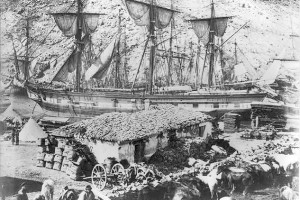To Thomas Graham: We Should Understand Russian History Differently

(PONARS Eurasia – ponarseurasia.org – Ivan Kurilla, Professor of History Volgograd State University – June 5, 2015)
In a recent Financial Times op-ed (“Europe’s Problem is with Russia, not Putin”) Thomas Graham, a managing director at Kissinger Associates and former senior director for Russia on the US National Security Council, makes far-reaching conclusions about contemporary Russia and international security by drawing on the position Russia held in the world in the 19th century. As an historian of that era, I cannot agree with Mr. Graham’s assumptions.
I agree with Mr. Graham that the recent policies of Russia toward Ukraine are in violation of international norms and pose a challenge to European security. Moreover, I agree that a certain “accommodation” of Russia by the West should be part of the solution.
However, his sweeping generalizations about Russian policies and Russia as an unchangeable nation lead to erroneous conclusions.
To begin with, even just using the words “Russia problem” brings to mind British propaganda from the 1830-50s, when Anglo-Russian competition between empires was at its peak. In that rivalry, the United States was definitely on the Russian side. The United States was highly critical of the hypocrisy of the English press, and supported Russia in its Crimean war (1853-1856) against European nations.
Furthermore, it is incorrect to define the 19th century ideological struggle by saying that “Russia maintained an autocratic regime as Europe moved towards liberal democracy.” Yes, Russia was the leading autocratic power in Europe, but the majority of European states were monarchies, sometimes very autocratic. Were monarchic Austria, Prussia, and, later, Germany moving toward liberal democracy?
There was some movement toward liberal principles in Europe, and Russia was part of it. During the Great Reforms of the 1860-70s, Russia abolished serfdom-two years earlier than the United States emancipated its slaves. Russia introduced self-governing localities, trial by jury, army and state apparatus reform, all in accordance with the liberal outlook of the age. Some of Russia’s reforms even overtook the progress of its Western neighbors.
It is very schematic to see Europe in the 19th century as a political or even civilizational unit making a choice between an “American type” liberal democracy or a “Russian type” autocracy. But even within such a scheme, Russia remained (and remains) a vital part of European civilization. We can see it as representing a pole of European ideology. So it is untrue to position Russia as “alien in worldview” to Europe. Russia, at least since the early 18th century, was integral to European dialogue, not an external challenger.
The phrase “European states seek security in balance; Russia seeks it in strategic depth” is also troubling and incorrect. First, Russia was always a part of a European balance. It was impossible to counter Napoleon in the 19th century or Hitler in the 20th without Russian participation in the coalitions against them. In fact, Mr. Graham contradicts his own thesis when he writes, “Russia has opposed the domination of Europe by a single power and remains uncomfortable with greater European unity.” It is here that we see the nature of Russia in any historical European coalition.
This aspect of Mr. Graham’s article calls to mind the “revisionist” historians’ critique of the U.S. foreign policy tradition that, according to historian Walter LaFeber, could base its security on dominance alone, as opposed to a balance of power as developed in Europe. It was Europe that developed the “concert of Europe” as a tool to contain any pretender for hegemony, while the U.S. established its hegemony on the American continent.
In addition, the author’s line about “resistance from the Germanic powers in the west, Great Britain and then the US in the south” sounds, quite frankly, a bit strange to any historian. It was Germany that started two world wars and invaded Russia, not vice versa. And what exactly did Great Britain and the United States do “in the south” of Russia? Looking at a map, it might be the case, at least for the British Empire, that it wanted to push, in the author’s words, “its borders outward, as far away as possible from its heartland.”
Finally, the author’s depiction of Russia as a “nearly featureless great Eurasian plain” sounds rather naïve-like descriptions people used to use in the 19th century, before they knew any better.
While I cannot agree with the historical arguments Mr. Graham uses, I support his call for future accommodation of Russia. “Accommodation” does not imply acceptance of Putin’s policies (as one response to Mr. Graham’s op-ed puts it) but an effort to find a lasting solution to the security and integration dilemmas that plague relations between Russia and the West. Painting Russia as essentially anti-Western and dangerous only helps to maintain fear and perpetual conflict. Searching for ways to “accommodate” Russia in the world community, drawing from Russia’s rich history of alliances and cooperation, would be more prudent.
PONARS Eurasia © 2015 All rights reserved. Article also appeared at ponarseurasia.org/article/thomas-graham-we-should-understand-russian-history-differently
